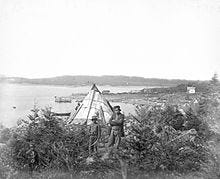Linguists comb Treaty of Washington from Indians’ POV
Quote Treaty author Schoolcraft on what it means
Our resent report about Michigan Ottawa and Chippewe Tribes gaining certain property rights on State-owned land based on the 1836 Treaty of Washington drew more readers than anything so far, including articles with ‘Trump’ in the headline. Consequently, I thought you might want to excercise that knowledge a bit more with a run around a report about the language of the Treaty.
“We, J. Randolph Valentine and Mary Ann Corbiere, were commissioned to address particular linguistic and translation issues pertinent to the interpretation of Article 13 of the 1836 Treaty of Washington.” This is the same article which I mentioned above as active in motivating the Inland Consent Decree.
Article 13 says, “The Indians stipulate for the right of hunting on the lands ceded, with the other usual privileges of occupancy, until the land is required for settlement.”
Valentine and Corbiere were asked basically if the Indians knew what all that meant especially “until the land is required for settlement.” How was it translated and what do those translations indicate about what the Indians understood it to mean?
They try to look at it the way the Ottawa and Chippewa saw it and point out that it was the Indians who insisted on “a usufructuary provision in the treaty.”
Usufructuary rights are what gives legal life to the trail the Chumash used from the Pacific shore in Carpinteria up the Santa Ynez Mountain range to the hunting lands on the other side of the first ridge.
Usufructuary comes from use. In the case of the Carpinteria Chumash trail, a judge ruled it had a right to exist, that right was from the use it had from time immemorial, and in that part of south central California people probably go back 15,000 years or more. Some of the first people coming down from Beringia would have stopped there. It’s that kind of place. So usufructuary is real even if it sounds funny. (Almost obscene. Imagine, ‘Go usufruct yourself!’ Hmp! Another way of saying, ‘Make yourself useful.’ Far out.)
Regarding the Treaty of Washington, hunting and fishing rights are the usufructuary functions in question. V&C speaking as one wrote, “I know from several treaties that the Indians typically desired to retain the right to hunt on lands ceded.” He has not found examples in previous treaties where Indians’ “rights should be negatively conditioned on the use of land by settlers.”
But that negative condition ‘until’ does exist in the !836 Treaty of Washington, V&C say, “suggesting the possibility that the ‘until’ clause did not originate with the Indians.” They do not say that the ‘until’ might have been added later, after the Indians had signed, sealed and delivered it. But I think it probably was along with the five year deadline for their living in Michigan at all which we know was addded after the Indians left Washington. In fact, U.S. Indian Commissioner Schoolcraft wanted their removal in two years. He was voted down.
As I’ve written before, breaking that seal was a dishonorable and illegal act. We can thank those Michigan heroes Lewis Cass and Henry Rowe Schoolcraft who both knew the Indians considered it essential to their way of life to continue hunting and fishing where and when they have since they’ve been in Michigan.
V&C write, “Parties to the 1836 Treaty of Washington undoubtedly showed considerable variation in their relative fluency in both English and Ojibwe, and in their familiarity with the legal register represented in the language of the treaty.” Schoolcraft was fluent in Ojibway while Attorney General Butler probably was not.
The investigators point out that one of the definitions of ‘until’ is the legalese term ‘unless and until’. In that case, they determine, “Article 13 allows for land that reverts to an unsettled state from a formerly settled one to become once again available to the Indians under the terms of the Treaty.’
Almost in jest, I think of huge swaths of Detroit which have been razed and are in advancing states of unsettlement. But Detroit was not part of this Treaty of Washington. Still the possibility exists.
In his memoirs Schoolcraft says this about the usufractory element in Aritcle 13, “This concession” (the Indians trading their land away) “was obtained on the principle of making limited reserves for the principal villages, and granting the mass of the Indian population the right to live on and occupy any portion of the lands until it is actually required for settlement.” Since he is the author of the treaty, we have to take his word as gospel.
In other words and in my reading, the five tribes can occupy any portion of the land until it is needed for settlement. Doesn’t that mean in the case of land that is in permanent conservation easement, such as the many Michigan State Game Preserves, these Ottawa and Chippewa tribes have the right by the Treaty of Washington to live on them?
Behind the Green Door your’ll find the entire Valentine/Corbiere Report
Keep reading with a 7-day free trial
Subscribe to Acorn Archive to keep reading this post and get 7 days of free access to the full post archives.



